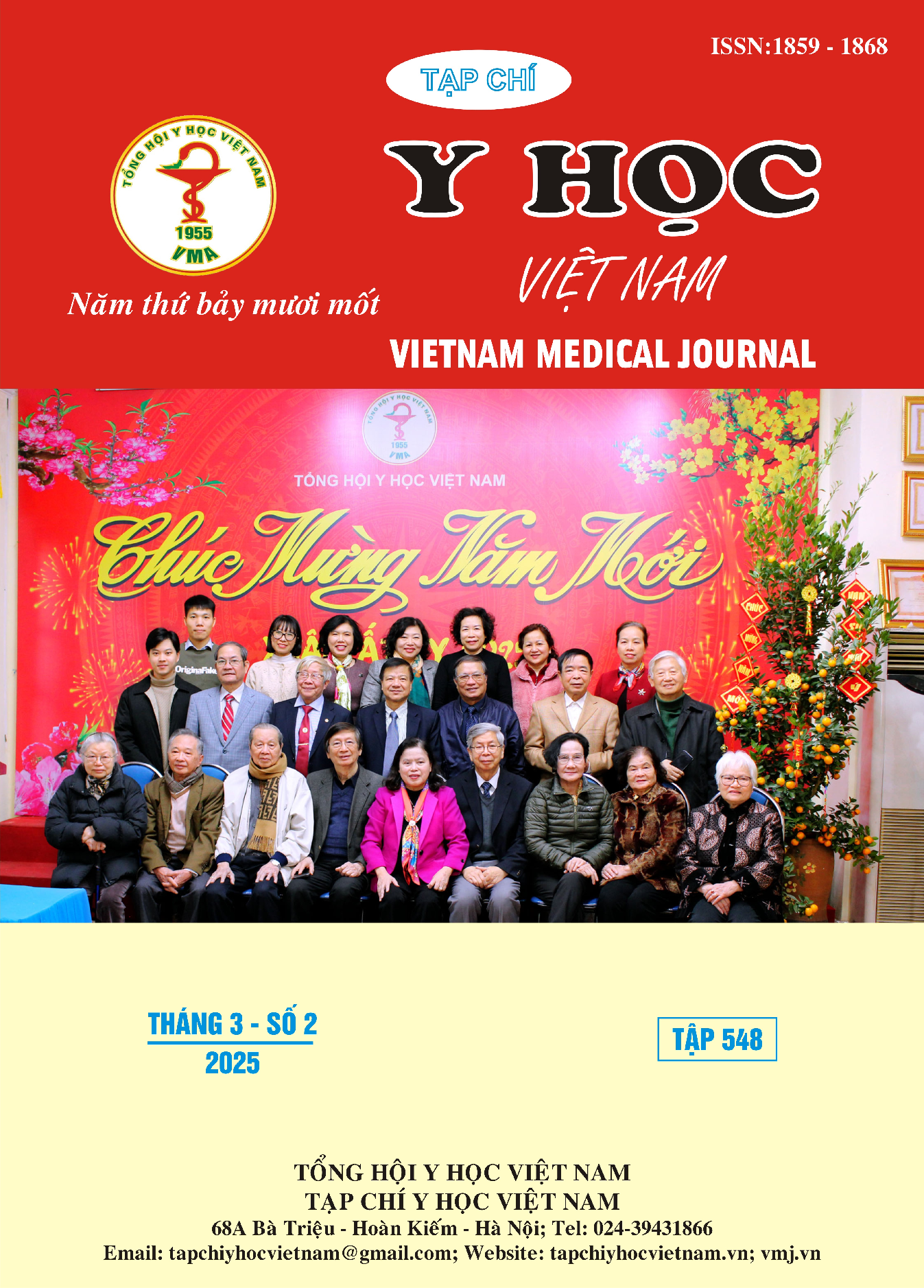EVALUATION OF TREATMENT RESULTS OF METASTATIC HORMONE-SENSITIVE PROSTATE CANCER WITH ADT COMBINED WITH DOCETAXEL AT K HOSPITAL
Main Article Content
Abstract
Objective: To evaluate the treatment outcomes and description of some adverse effects of ADT combined with docetaxel regimen in patients with metastatic hormone-sensitive prostate cancer at K hospital. Patients and research methods: A retrospective descriptive study with longitudinal follow-up was conducted on 55 patients with mHSPC treated with ADT combined with docetaxel at K hospital from January 2022 to the end of August 2024. Results: The mean age was 68.2±6.9 years (55-86). The most common symptom was urinary disorder, accounting for 38.2. The proportion of patients with Gleason score ≥ 8 accounted for 90,9%. The proportion of T4 disease accounted for 43,6%. The median PSA before treatment was 130ng/ml (Interquartile range: 100-804). The proportion of patients with bone metastasis was 92.7%. At 6 months after starting treatment, 21.8% of patients achieved PSA <0.2 ng/ml. The proportion of patients achieving PSA nadir <0.2 ng/ml was 34,5%. At 24 months after starting treatment, 10 patients progressed to mCRPC, accounting for 18.2%. At 6 months after starting treatment, patients with PSA levels <0.2 ng/ml had a longer survival time from CRPC than other groups with statistical significance (p=0.002). Patients with PSA nadir levels <0.2 ng/ml had a longer survival time from CRPC than patients with PSA nadir levels ≥0.2 ng/ml with statistical significance (p=0.007). The rate of grade 1 anemia was 16.4%. The rate of grade 1 leukopenia was 27.3%. The rate of grade 1 thrombocytopenia was 18.2%. The main non-hematological adverse effects was grade 1 AST/ALT elevation, accounting for 13.2%. Conclusion: ADT combined with docetaxel is a treatment option for patients with mHSPC, achieving effective treatment and good tolerance. Regular monitoring of PSA index helps to evaluate treatment response and prognosis.
Article Details
Keywords
Metastatic Hormone-Sensitive Prostate Cancer, Docetaxel in combination with androgen deprivation therapy
References
2. Fizazi K , Foulon S , Carles J et al. Abiraterone plus prednisone added to androgen deprivation therapy and docetaxel in de novo metastatic castration-sensitive prostate cancer (PEACE-1): a multicentre, open-label, randomised, phase 3 study with a 2 × 2 factorial design. Lancet. 2022 Apr 30;399(10336):1695-1707.
3. Park K, Kim IY, Park I et al. Effectiveness of Adding Docetaxel to Androgen Deprivation Therapy for Metastatic Hormone-Sensitive Prostate Cancer in Korean Real-World Practice. Yonsei Med J. 2023 Feb;64(2):86-93.
4. James N.D., Sydes M.R., Clarke N.W. Addition of docetaxel, zoledronic acid, or both to first-line long-term hormone therapy in prostate cancer (STAMPEDE): survival results from an adaptive, multiarm, multistage, platform randomised controlled trial. Lancet (London, England) 2016;387:1163–1177.
5. Lendorf ME, Peter Meidahl Petersen, Andrea Steen Svendsen et al. Effectiveness of Docetaxel for Metastatic Hormone-sensitive Prostate Cancer in Clinical Practice. Eur Urol Open Sci. 2021 Feb; 24: 25–33.
6. Sweeney CJ, Chen Y-H, Carducci M, Liu G, Jarrard DF, Eisenberger M. Chemohormonal therapy in metastatic hormone-sensitive prostate cancer. N Engl J Med. 2015;373(8):737–746.
7. Whi-An Kwon, Jae Young Joung, Jung Eun Lee et al. Use of docetaxel plus androgen deprivation therapy for metastatic hormone-sensitive prostate cancer in Korean patients: A retrospective study. Investig Clin Urol. 2019 May; 60(3): 195–201.


